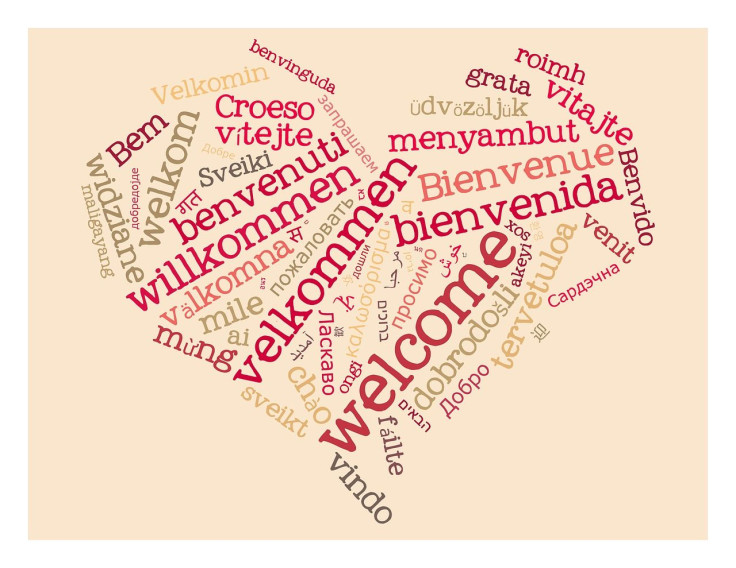The Brains Of Hyperpolyglots, People Who Speak 6 Or More Languages, Function Differently Than Ours

Language is our human birthright. Children, barely able to feed or clothe themselves, quickly master the basics of languages they’re exposed to with next to no instruction. But while most can speak (or sign) at least one language, and a few of us may even know two or three, hyperpolyglots — those who can fluently speak about six languages or more — are few and far between. What makes them so special?
Not everyone can become a hyperpolyglot, journalist Michael Erard, author of Babel No More: The Search for the World's Most Extraordinary Language Learners, told Time magazine. He said they’re neither born nor made, but rather born to be made — the fortunate beneficiaries of good genes and disciplined study. Unlike multilinguals who learn languages through exposure from their environment, such as growing up in a bilingual household, hyperpolyglots dedicate their lives to actively learning and mastering languages.
One of the most famous hyperpolyglots in history was Emil Krebs, a 19th century German diplomat who, by some accounts, had mastered 65 languages by the time of his death. In 2004, scientists had the opportunity to dissect Krebs’s brain in an effort to confirm whether his impressive language skills were due to a unique brain structure. While they observed distinct differences in the region of Krebs’s brain responsible for language — known as Broca’s area — they were ultimately unable to answer whether his unique brain was different since birth or if it grew to be that way from learning so many new languages.
Today, we know multilinguals and hyperpolyglots have distinct differences in their brains’ neural activity when compared to people who can only speak one language. This is because the human brain is a highly adaptive organ. Any type of cognitive activity, whether it’s doing a puzzle, playing an instrument, or learning a language, can build new neural pathways.
Language learning in particular creates new pathways that not only strengthen the brains of multilingual individuals but also facilitate further language learning. In a 2014 experiment, for example, brain scans showed people who spoke only one language had to work harder to focus on a single word. Ellen Bialystok, a psychologist at York University in Toronto, who wasn’t involved in the study, told LiveScience this happened because multilingual brains are more efficient at tuning out irrelevant information.
Practice and Persistence
Despite such obvious brain differences, Alex Rawlings, a skilled British hyperpolyglot who speaks 15 languages, suggests polyglots are really no different from anyone else. “To be honest with you, when I am sitting in the classroom with other people learning languages I don’t feel as though I am ahead of them,” he told Medical Daily. “I don’t feel as though I am doing something they are not.”
Instead, he says his skills come from practice and persistence, which in turn strengthens his brain. This idea can be illustrated in a 2012 study, in which researchers from Lund University in Sweden scanned the brains of recruits at the Swedish Armed Forces Interpreter Academy before and during an intensive foreign language learning course. While some of the recruits were language students, other students majored in medicine and science — they were the control group.
Results revealed that language students had an easier time getting through the course, and therefore excelled in it. What’s more, brain scans showed specific areas of their brains responsible for language had grown during the course of the study, while the brains of the medicine and science participants remained the same. The researchers concluded that brain growth during language acquisition is largely related to both how easy the student finds the course and how well they perform, The Guardian reported.
Rawlings noted a similar phenomenon in his language-learning experiences. He explained that although he began on the same level as other students, he soon realized the overall process seemed easier for him than his classmates.
“I was more able to speak the language because I had more experience in terms of expressing myself and getting what I wanted, and less fear of making mistakes and less fear in things you don't have to be scared of, such as, getting your verbs wrong,” Rawlings said. “I wasn't so bothered because I just wanted to get out there and talk. It wasn't that I had this amazing ability in comparison to my fellow students.”
Unlike Erard, Rawlings believes anyone can achieve the linguistic capacity of a hyperpolyglot and that all they need is enough time and effort. He also said people often focus too much on how many languages they can speak and not enough on their overall dedication and passion for the art of language learning. “I know people who speak six languages at not a particularly impressive level, and you put them next to someone who speaks four languages at an extremely fluent level,” Rawlings said. “Why is one a hyperpolyglot and the other one isn’t?”

Learning to be a Polyglot
If we all have the potential to become hyperpolyglots (we definitely have the ability to become bilingual) why can only one in four Americans hold a conversation in a second language? The answer may lie in how languages are taught.
In a 2014 study, Dr. Kara Morgan-Short, a professor at the University of Illinois at Chicago investigated the ways in which teaching a language changed students’ brain development and their eventual fluency. For her study, two groups of students were taught a made-up language created by linguists to mirror real human language. One group of students learned the language through explanations while a second group learned by being immersed in the language.
Brains scans showed that the brains of students who were immersed in the made-up language were able to process it more like native language speakers than those who were taught the language through a set of rigid rules. What’s more, six months after language exposure had ended, students who were immersed in it still performed well on language tests. In an essay for The Guardian, Susanna Zaraysky, a hyperpolyglot who can speak seven languages, wrote she would have never achieved hyperpolyglot status by formally learning languages in school.
“Learning languages is not just about memorizing vocabulary and grammar,” Zaraysky wrote. “I supplement my classes and self-study books with lots of songs, movies, TV, and radio.”
Researchers suspect that aside from immersing themselves, hyperpolyglots are able to learn so many languages because they’ve got studying them down to a science. “They know how they learn, so they don’t waste time with methods that don’t work for them,” Erard told Time. “They don’t give up. They adjust their methods as they get older” — and as mentioned above, they get better at tuning out irrelevant information.
Rawlings, who has also taught English, German, Russian, and Greek, agrees that it’s not just how a student is taught but also how they choose to learn — he emphasizes having a curious mind. “The one thing that I do see between all of them is curiosity, a passion for speaking to other people,” he said. “The students that do well are the students who after the lesson send you 20 emails.”
It’s never too late to start learning a new language. Dr. Viorica Marian, lead author of a 2014 study on the benefits of a bilingual brain, emphasizes that motivation and diligence are crucial to learning a second language, especially later in life. She also said it’s important to make it fun. “One can listen to music and watch films in the other languages, read books, and visit websites (news outlets, etc) in that language, travel to countries where that language is spoken when possible, and cultivate friendships with individuals who speak that language,” Marian said.
Meanwhile, Rawlings said he would incorporate learning into his everyday activities. He’d study language during his daily 45-minute commute, or rather than listening to radio in a language he already knew, he’d listen to it in one that he was learning. Again, immersion is key.
While we know what’s going on inside hyperpolyglots’ brains as they learn languages, it’s still unclear which came first — the neurological advantage or the passion for learning languages. Just like those who believe it’s a unique ability, however, there are many other polyglots who believe anyone has the potential to learn, all they need is a bit of the same passion.
“I think that accepting the fact that you can't be a perfectionist is a very important part of becoming a polyglot because you know language learning never stops; there is no end point,” Rawlings said. “There is always more words to learn and you're never going to perfect it.”
Correction: In a previous version of this story Michael Erard’s name was misspelled. It has now been corrected.



























